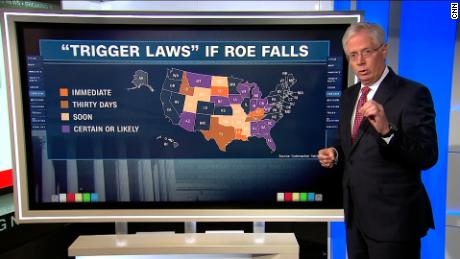AD
begin quote from:
https://www.cnn.com/2022/06/25/politics/reshaping-politics-roe-v-wade/index.html
A stunning moment in American history decades in the making will reshape politics

Analysis by Stephen Collinson, CNN
Updated 7:44 AM ET, Sat June 25, 2022
(CNN)The day that remade America was decades in the making.
The Supreme Court's overturning of a woman's right to an abortion on Friday was a legal, political and societal thunderbolt that merits the overused term "historic" because it will change life in multiple ways, many still unknown.
But while shocking, especially since it goes against majority public opinion on the issue, it was not a surprise. The ruling was the result of a staggeringly successful generational quest by the conservative movement at all political levels, from grassroots social and religious activists through the founding leaders of a right-wing legal establishment to successive Republican presidents.
Democrats working through phases of disbelief, fury and pain on Friday vowed to fight back. But their mission, like that of their conservative vanquishers, could last decades or even longer in pursuit of a distant goal.
"Make no mistake: This decision is the culmination of a deliberate effort over decades to upset the balance of our law. It's a realization of an extreme ideology and a tragic error by the Supreme Court," President Joe Biden said. But he added: "This is not over."
Another top Democrat, Sen. Elizabeth Warren of Massachusetts, said she was "spitting mad."
Enter your email to sign up for CNN's The Point with Chris Cillizza.
close dialog
"We've got tools. We're going to use them in November. We're going to make sure that we elect enough people who believe in democracy that we can pass Roe v. Wade and make it the law of the land again," she told CNN. "Only this time, we'll do it by statute and enforce it."
But the generational nature of the struggle to come means it's not likely to be septuagenarians like Biden and Warren who win it.
The prospects of an immediate political riposte are also unlikely, given the Democrats' current political woes. If the outpouring of liberal emotion is to coalesce into a counter-movement to restore abortion rights, it will require the same level of multi-decade dedication shown by conservatives. It will call for a network of political groups all pushing in the same direction and for national politicians with the talent to turn out voters on the issue using their time in office to build a competing legal and political structure effective at pressing change. And it will have to begin as a rearguard action after a stunning defeat as multiple conservative states pass or implement flash laws to outlaw abortion for millions of women.
Abortion is a deeply personal issue for many Americans that involves choices about when life begins and an individual's rights to make a decision about their own body. It becomes a sensitive and divisive political issue when it comes to the questions of whether and how government can dictate these moral and legal questions and what the Constitution permits.
So just as liberals may now be newly fired up, the anti-abortion movement will not rest. Some activists are already striving to elect a Republican-led Congress and president who would outlaw abortion not just in conservative states but also in the blue ones that immediately vowed Friday to protect a woman's right to choose. And while Biden can carp about Republican extremists and liberals complain about Republican presidents failing to win the popular vote, the conservative movement looks just as likely to mobilize to use the US political system to preserve its win as Democrats are to try to overturn it.
Senate Minority Leader Mitch McConnell, who did as much as any Republican leader to transform the Supreme Court, praised the years of conservative campaigning that had led to Friday's decision.
"Millions of Americans have spent half a century praying, marching and working toward today's historic victories for the rule of law and for innocent life. I have been proud to stand with them throughout our long journey and I share their joy today," the Kentucky Republican said.
Arkansas Republican Gov. Asa Hutchinson tweeted: "... we are able now to protect life."
A cascade of consequences
Friday's victory was so total for conservatives and will be so difficult for Democrats to reverse not only because of its immediate legal consequence, but also because of the cascade of effects it will unleash, some not even connected to abortion.
Anti-abortion activists are celebrating not just potentially millions of future pregnancies that will go to term, but a profound turn in the country's policies as well, which will change what it means to live in America for men as well as women.
But at the same time, tens of millions of women went to bed Friday evening with one fewer constitutional right than they had woken up with. As conservative states begin to outlaw abortion entirely, the ledger of Americans' rights will depend on where they live or conceive. For apparently the first time in the country's historic march, the Supreme Court has taken away a previously enshrined constitutional right. The starkly literal reading of the Constitution by the court's conservative majority in this case -- as well as in other judicial haymakers on guns and religion this week -- beckons an era of societal upheaval.
If one constitutional right can be wiped out, why not others? Already, and despite the assurances of several of the court's conservatives, same-sex marriage, contraception and even in vitro fertilization treatments are beginning to look more vulnerable.
This week's rulings on abortion and guns have cemented the court's new conservative majority as a staggeringly powerful force in American life -- one with the audacity to make far-reaching change. Because this upheaval comes from a bench of deeply religious conservatives, it is certain to trigger confrontations with more secular, diverse sectors of society. These factors, and the court's recent opinions conflicting with majority public opinion, mean that America's vicious ideological divide is all but certain to deepen. But the justices are insulated from politics by lifetime appointments.
A triumph for Trump and McConnell
If it wasn't the case already, Friday solidified the presidency of Donald Trump, who helped tip the court to the right, as one of deep, historic consequence. It validated the marriage of convenience between the ethically challenged former President and evangelicals and social conservatives, which was rooted in the promise that he would nominate anti-abortion justices.
And it confirms McConnell, whose contentious maneuverings unlocked the path to the conservative majority, as one of the most meaningful political figures of all time. Trump and McConnell's work -- in the shape of three comparatively young justices -- will be changing the face of America for long after they are gone. The nature of the Senate, which allows Republicans to wield considerable power despite representing far fewer people in more rural states, will make it difficult for Democrats to transform majority opinion into a law codifying Roe v. Wade.
In the short term, Friday's decision could play into the midterm elections in November, which House Speaker Nancy Pelosi vowed to turn on the abortion decision. But with voters hammered by high inflation and record gasoline prices, they may be focused on more pressing economic concerns -- especially in the places where Democrats need to make gains in order to hold on to their narrow majorities.
The new reality on abortion is certain to add even more intensity to the 2024 presidential campaign with Democrats facing the possibility of a Republican monopoly on power.
And as they were in the pandemic, governors and state legislators will become vital players on a fearsomely divisive national issue, as some hurriedly pass laws to outlaw the right to end a pregnancy and others fight to preserve it. There are likely to be disputes over the power of states to stop residents seeking abortions from traveling to states where the procedure is still allowed.
Big business is about to be embroiled in a fight over the rights of female employees that could affect the locations of headquarters and will require firms to consider how to deal with new health care conundrums. The conservative majority suggested in its opinion that sending abortion back to the states to decide will let democracy work it out. But nothing in the polarized state of American politics suggests this is anything more than wishful thinking. Abortion is likely to drive an already torn nation further into self-estrangement.
A historic campaign to change America
In many ways, Friday's tumultuous events were the right's answer to an almost as epic summer week seven years ago, when the court seemed to launch a period of liberal ascendency by saving the Affordable Care Act and ruling that same-sex marriage was constitutional. Those heady few days, however, helped spark a backlash that led to Trump's presidency and, ultimately, to this week's momentous opinions.
But the genesis of this moment came long before, beginning to build soon after the 1973 Roe v. Wade decision the court just overturned. It took a web of alliances and interlocking campaigns by religious conservatives, activist groups, fundraisers, grassroots lawmakers, faith leaders, anti-abortion marchers, national political leaders, talk radio hosts, right-wing media figures and Republican presidents over decades to come to fruition. It involved years of confirmations that turned the federal judiciary to the right, then de facto alliances between jurists and conservative politicians in the states to bring cases weakening and eventually ending the federal right to an abortion up through the courts.
And it took Supreme Court nominees misleading Senate confirmation hearings, with a wink and a nod, on their opposition to overturning precedent to create the majority in the marble-pillared Supreme Court chamber that would finish the job.
The movement was especially energized by the conservative renaissance that President Ronald Reagan engineered. As California governor, he had signed a law allowing some exceptions to abortion but changed his views after a long period of soul searching and after spotting an opening to use the issue to electrify the conservative movement. In February 1984, Reagan wrote in his diary about a conversation with a woman in Peoria, Illinois, who had broken with Republicans because of his stance on the issue.
"I made my pitch that there were 2 people's rights involved in abortion — the mother's & the unborn child," Reagan wrote, spelling out a message that fortified the mission even after his death.
The next Republican president, George H.W. Bush, appointed Justice Clarence Thomas, who waited in silence for decades on the bench for his hardline conservative jurisprudence to dominate the court. He published a concurrent opinion on Friday that read like a rallying call for activists and conservative states to challenge other precedents, on same-sex marriage and contraception.
President Bill Clinton kept conservatives at bay for eight years and his nominee, Justice Ruth Bader Ginsburg, became an icon for women's rights during her long tenure. But her death in 2020, while Trump was in the White House, opened the way for a solidifying of the 5-4 conservative majority that overturned Roe on Friday.
The next President, George W. Bush, did his bit for an abortion earthquake still 17 years in the future by nominating Justice Samuel Alito, who penned Friday's majority opinion.
The Obama presidency featured then-Majority Leader McConnell's blockade of the President's final nominee, Merrick Garland (now Biden's attorney general), which allowed newly elected Trump to elevate another member of Friday's majority, Justice Neil Gorsuch. And then McConnell reversed his hastily created rule against confirming justices before elections, which he'd used to keep Garland off the court, to install another anti-abortion justice in Amy Coney Barrett days before Trump lost in 2020. Without his efforts, the fifth vote to reverse Roe would not have existed, since Chief Justice John Roberts, while opposing abortion, signaled support for a less radical course.
These are all fateful presidential decisions and congressional battles fought over decades. They are a taste of what Democrats face if they want to reverse Friday's decision and the coming era of conservative jurisprudence. Their long haul will be complicated by the fact that Gorsuch, Barrett and Justice Brett Kavanaugh are only in their 50s and figure to have years of service on the court in which to further solidify Friday's ruling.
For abortion rights activists, meanwhile, the next few presidential elections just got even more critical and will test whether complacency among liberals about the supposed inviolability of the right to end a pregnancy will begin to change.
Almost every Republican campaign, up and down the ballot, has long included a push for ending abortion. The issue was a unifying force in Republican politics as activists drove toward the single, distant goal that was realized on Friday.
Democrats have yet to prove that they have the discipline, organizational capacity or rising political stars to mount a similar fight of their own.



























No comments:
Post a Comment